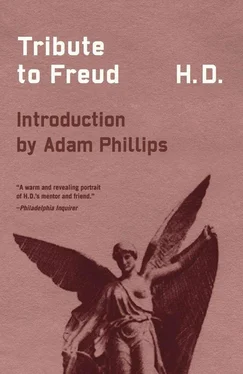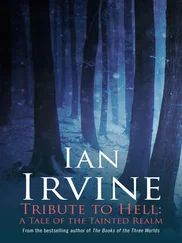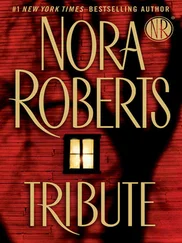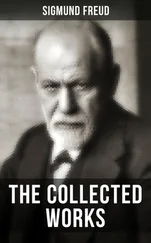Newness was what happened to Freud’s bibelots and H. D.’s remembering when their contexts changed. We are always remaking history. Returning to the details of her childhood, in Freud’s consulting room, surrounded by his little treasures, she was redefining both her childhood and them. “ ‘My mother, my mother,’ I cry,” she noted of a dream, “I sob violently, tears, tears, tears.” Her mother was Moravian, and allied to the Mystery and to love feasts; her mother painted, she was musical, and it was she who gave his first musical training to her brother, H. D.’s uncle, J. Fred Wolle, who later studied organ and counterpoint in Munich and was, in H. D.’s Bethlehem childhood, organist of the Moravian church. He established the now seventy-five-year-old Bach Festivals for which Bethlehem is chiefly known today. H. D.’s grandfather (Papalie), the Rev. Francis Wolle, was the author of Desmids of the United States (1884), the well-known Freshwater Algae of the United States (1887), and Diatomaceae of North America (1890). He used the microscope, but more significantly to his family he had been for twenty years, until his retirement in 1881, head of the Moravian Seminary. H. D.’s ambience was Moravian.
Her father was older and, as she repeatedly inferred, from “outside.” H. D. was the child of the second marriage of a widower. He was a middle-western New Englander; he taught mathematics; he was an astronomer who mapped the stars at night and napped until noon. “I never had a letter from him in my life, but our mother shared her letters from him, on rare occasions when he was away from home. He would write whimsical, rhymed verses sometimes.”
She was her father’s favorite, her older brother was her mother’s, she felt. “But the mother is the Muse, the Creator, and in my case especially, as my mother’s name was Helen.” “Obviously,” she wrote in “Advent,” “this is my inheritance. I derive my imaginative faculties through my musician-artist mother.” But the inheritance was not simple. “ ‘My mother, my mother,’ I cry. . ” As she wrote elsewhere, “She only felt that she [was] a disappointment to her father, an odd duckling to her mother.”
Charles Doolittle was born in 1843. His first marriage took place in Michigan in 1866; his second, to Helen Wolle, in 1882. He was 43 when H. D. was born, and Professor of Mathematics and Astronomy at Lehigh. From 1895 to 1912 he was Professor of Astronomy at the University of Pennsylvania and Director of the Flower Astronomical Observatory in Upper Darby, on the outskirts of Philadelphia. He was a scientist with honorary degrees, and the author both of monographs on the results of observations with the Zenith telescope, and of Practical Astronomy as Applied to Geodesy and Navigation (1885). His son Eric (1869–1920) succeeded him both to the professorship and to the directorship of the observatory.
H. D. as a girl sometimes thought of William Morris as a spiritual father. “This is the god-father that I never had. . I did not know much about him until I was (as I say) about sixteen. I was given a book of his to read, by Miss Pitcher, at Miss Gordon’s school; — a little later, Ezra Pound read the poetry to me. The book Miss Pitcher gave me was on furniture, perhaps an odd introduction. But my father had made a bench for my room, some bookcases downstairs, from William Morris designs. My father had been a carpenter’s apprentice, as a boy. This “William Morris” father might have sent me to an art school but the Professor of Astronomy and Mathematics insisted on my preparing for college. He wanted eventually (he even said so) to make a mathematician of me, a research worker or scientist like (he even said so) Madame Curie. He did make a research worker of me but in another dimension. It was a long time before I found William Morris and that was by accident, though we are told that “nothing occurs accidentally.” I must choose, because my life depends upon it, between the artist and the scientist. I manage in the second year of college to have a slight breakdown and I manage to get engaged to Ezra Pound.”
She made her choice. Her parents objected to Pound as a son-in-law. She had left Bryn Mawr, then she left Philadelphia for New York, and then left New York for London. Henceforth she was alone. She wanted her mother but she wanted her father too. Both figured in her “legend.” Her poem “Tribute to the Angels” was written in the same year as “Writing on the Wall.” In it she asks,
what is this mother-father
to tear at our entrails?
what is this unsatisfied duality
which you can not satisfy?
“The house in some indescribable way,” she wrote in “Advent,” “depends on father-mother. At the point of integration or regeneration, there is no conflict over rival loyalties.” This was the integration she sought, the point at which she could say, having memory with understanding, “I owned myself.”
The breaking-away, however, had been a necessary step. Looking back, in 1950, she wrote me, “I don’t suppose it was the fault of Bryn Mawr that I didn’t like it. My second year was broken into or across by my affair with E.P., who after all, at that time, proved a stimulus and was the scorpionic sting or urge that got me away — at that time it was essential. I felt there I had fallen between two stools, what with my mother’s musical connection and my father’s and half-brother’s stars! I did find my path — thanks partly to E.P., also R.A., Lawrence and the rest.”
But she separated from Richard Aldington and, finally, divorced him. The story she has told in Bid Me to Live. Aldington had already given his version in Death of a Hero. It was the subject of John Cournos’ Miranda Masters. D. H. Lawrence touched on it briefly in Aaron’s Rod. Few episodes have been so amply treated.
Lawrence appears frequently in Tribute to Freud, especially with reference to his story, “The Man Who Died.” In Bid Me to Live he plays a significant role. He had the gloire. But her reference in “Advent” to their leave-taking is enigmatic: “ ‘I hope never to see you again,’ he wrote in that last letter.” Perhaps her comments to herself after reading Harry Moore’s biography of Lawrence have some relevance. “I have read,” she said, “the last two-thirds of the book, painstakingly reviewing my own feelings. I find confirmation of certain problems of my own, for instance, about Freud. Lawrence was instinctively against Sigmund Freud, Frieda was intelligently for him. But it was long before I had ‘come’ to Freud that Frieda spoke to me of ‘love.’ It was in the Madrigal [ Bid Me to Live ] drawing-room, but did not come into my romance. Frieda and I were alone together in the big room. Frieda said that she had had a friend, an older man, who had told her that ‘if love is free, everything is free.’ There had been the scene the night before or shortly before, in which Lawrence said that Frieda was there for ever on his right hand, I was there for ever — on his left. Frieda said when we were alone, ‘but Lawrence does not really care for women. He only cares for men. Hilda, you have no idea of what he is like .’”
Pound’s belligerent disapproval of Freud cooled their friendship, though it was rewarmed during the St. Elizabeth years. An unpublished letter from Pound to H. D. in 1954 gives the tone of his disapproval. “I can’t blow everybodies’ noses for ’em,” he wrote. “Have felt yr / vile Freud all bunk / but the silly Xristers bury all their good authors /. . instead of sticking to reading list left by Dante /. . You got into the wrong pig stye, ma chère. But not too late to climb out.” *
Читать дальше











